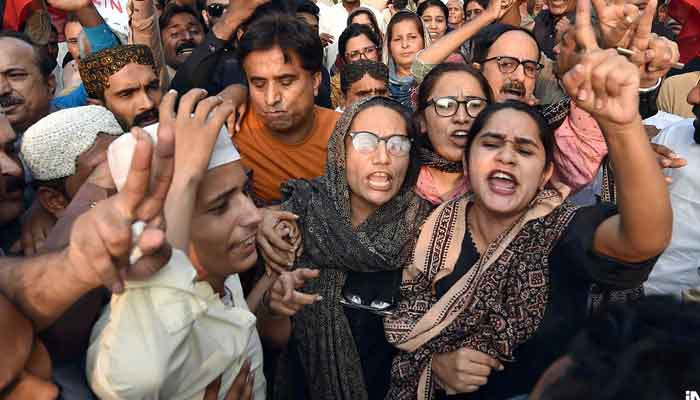Karachi protests
March was held in protest of killing of Dr Shahnawaz Kunbhar who was gunned down by Mirpurkhas police
Being a progressive in Pakistan is not easy. One is often engaged in an uphill battle to prove that they are not some kind of spy or subversive agent of the West, withstand threats of violence and actual violence from regressive elements and, all the while, deal with a state that is more interested in finding ways to shut you down then protect your rights. The nature of this struggle was on full display this past Sunday (October 13, 2024) in Karachi when protesters part of the ‘Sindh Rawadari March’ clashed with police outside the press club while resisting arrests for violating Section 144, which was imposed the previous day by the Karachi commissioner. The march was held in protest of the killing of Dr Shahnawaz Kunbhar who was gunned down by the Mirpurkhas police in a reportedly staged encounter on September 19 after being accused of blasphemy. According to social media posts, the police apparently ended up rough-handling the Rawadari March protesters, an act that has rightly been condemned across a spectrum of civil society actors. Meanwhile, a counter-protest held by the Tehreek-e-Labbaik Pakistan (TLP) also led to clashes with the police. Section 144 was imposed in the context of the Shanghai Cooperation Summit in Islamabad, which kicks off today.
The Sindh Human Rights Commission (SHRC) has found that Dr Kunbhar was wrongfully identified as a blasphemy suspect likely due to “systemic flaws in the FIR registration process”, leading to his death. One can understand why many would want to protest such blatant injustice. Section 144 can only be applied in urgent cases where there is a clear threat of danger. In this case, the threat of violence appears to have emanated from the potential of clashes between those protesting against Dr Kunbhar’s killing and the counter-protesters and the overall need to avoid such incidents given the SCO Summit.
Pakistan needs to show that it is capable of hosting large international events and cannot be held hostage by political instability. However, it often appears as though there is never a right moment for progressive voices to be heard in the country. They can be silenced in the name of avoiding violence and instability when it is other elements causing said violence and instability. Meanwhile, the country is no stranger to regressive elements simply ignoring any directions from the state when it comes to holding protests and getting off with a slap on the wrist. They also seem to enjoy a free hand when it comes to threatening others and levelling false accusations against them. All of this leads to an environment where those marching for rights and justice can be the most likely to be deprived of them. And as important as maintaining stability is, Pakistan is unlikely to make much progress if the state continues to take this lopsided approach.
-
 Tucker Carlson Says Passport Seized, Staff Member Questioned At Israel Airport
Tucker Carlson Says Passport Seized, Staff Member Questioned At Israel Airport -
 Taylor Swift Made Sure Jodie Turner-Smith's Little Girl Had A Special Day On 'Opalite' Music Video Set
Taylor Swift Made Sure Jodie Turner-Smith's Little Girl Had A Special Day On 'Opalite' Music Video Set -
 Eric Dane Says Touching Goodbye To Daughters Billie And Georgia In New Netflix Documentary
Eric Dane Says Touching Goodbye To Daughters Billie And Georgia In New Netflix Documentary -
 Channing Tatum Reveals What He Told Daughter After Violent Incident At School
Channing Tatum Reveals What He Told Daughter After Violent Incident At School -
 King Charles Lands In The Line Of Fire Because Of Andrew Mountbatten-Windsor
King Charles Lands In The Line Of Fire Because Of Andrew Mountbatten-Windsor -
 Denise Richards Doubles Down On Abuse Claims Against Ex Husband Aaron Phypers Amid Show Return
Denise Richards Doubles Down On Abuse Claims Against Ex Husband Aaron Phypers Amid Show Return -
 Russia Set To Block Overseas Crypto Exchanges In Sweeping Crackdown
Russia Set To Block Overseas Crypto Exchanges In Sweeping Crackdown -
 Gwyneth Paltrow Reveals Deep Personal Connection With Kate Hudson
Gwyneth Paltrow Reveals Deep Personal Connection With Kate Hudson -
 Prince Harry, Meghan Markle’s Game Plan For Beatrice, Eugenie: ‘Extra Popcorn For This Disaster’
Prince Harry, Meghan Markle’s Game Plan For Beatrice, Eugenie: ‘Extra Popcorn For This Disaster’ -
 OpenAI To Rollout AI Powered Smart Speakers By 2027
OpenAI To Rollout AI Powered Smart Speakers By 2027 -
 Is Dakota Johnsons Dating Younger Pop Star After Breakup With Coldplay Frontman Chris Martin?
Is Dakota Johnsons Dating Younger Pop Star After Breakup With Coldplay Frontman Chris Martin? -
 Hilary Duff Tears Up Talking About Estranged Sister Haylie Duff
Hilary Duff Tears Up Talking About Estranged Sister Haylie Duff -
 US Supreme Court Strikes Down Trump’s Global Tariffs As 'unlawful'
US Supreme Court Strikes Down Trump’s Global Tariffs As 'unlawful' -
 Kelly Clarkson Explains Decision To Quit 'The Kelly Clarkson Show'
Kelly Clarkson Explains Decision To Quit 'The Kelly Clarkson Show' -
 Inside Hilary Duff's Supportive Marriage With Husband Matthew Koma Amid New Album Release
Inside Hilary Duff's Supportive Marriage With Husband Matthew Koma Amid New Album Release -
 Daniel Radcliffe Admits To Being Self Conscious While Filming 'Harry Potter' In Late Teens
Daniel Radcliffe Admits To Being Self Conscious While Filming 'Harry Potter' In Late Teens




